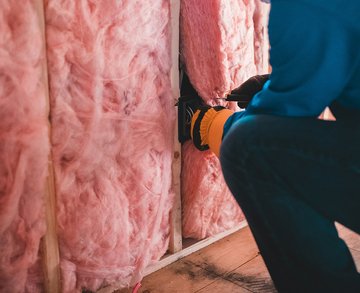When should my property be put on the market?
It normally takes about 2-6 weeks to find and move in a suitable applicant for a property. Since October 2008 it has become a legal requirement for all properties marketed for letting to have an Energy Performance Certificate (EPC). We can arrange this for you.
Who do I need to advise that I would like to let my property?
You will need to advise your lender and, if the property is leasehold, you’ll need to check with the management company or your leasehold agreement to ascertain if there are any restrictive covenants which forbid letting. If they do agree, you’ll need to check if there are any other restrictive covenants. You should also notify your Buildings & Contents insurers, who will advise you of the requirements to maintain your policy. You may need to change your insurer, as some insurers will not insure tenanted properties or they may reduce the level of cover provided. We can ask one of our Financial Advisors to contact you in order to provide a quote.
What happens if my tenant cannot pay the rent?
Unfortunately, on occasions tenants’ circumstances change and they can no longer afford to pay the rent. You can protect yourself against loss of rent and legal costs and we can arrange cover through Rent & Legal protection. The cost varies according to the package provided:
12 month policy no excess is £300 + Vat
12 month policy with two month excess is £200 + Vat
The policy provides as follows:-
24 Hour helpline services
Repossession of the property should a tenant fail to vacate
Cover for property damage
Eviction of squatters
Rent recovery
Legal defence
Hotel expenses
Storage costs
It is advisable to retain enough funds to meet at least one mortgage payment as some companies apply a penalty for missed or late payments.
To what standard do I need to leave the property?
It is important to ensure the property is left in a good, clean condition and that the garden is neat and weed-free. The condition you leave the property in should be the condition it is returned to you by the tenants – subject to normal wear and tear. We can only make it a tenant’s responsibility to have carpets etc. professionally cleaned if they were done so prior to the tenant moving in.
Do I need to redecorate?
Not everyone has the same taste! We therefore recommend that the décor is neutral and that carpets are in good condition and neutral in colour. Most tenants also prefer vinyl or tiles on bathroom floors instead of carpet.
Will I be liable to pay tax on the income?
Your rental income is liable to tax, whether you’re a taxpayer in the UK or not. If you’re a resident overseas, we will, as your Managing Agents, retain sufficient funds to meet tax liabilities, under the provision of the Taxes and Management Act 1970, unless you’re able to provide us with a Tax Exemption Certificate. You’ll need to contact the Inland Revenue in order to obtain a NRL1 form (Non Resident Landlord). The basis of your assessment will be the gross rent received, less a deduction for allowable expenses relating to your property during the tenancy.
We’re unable to calculate your assessments with the Inland Revenue and recommend that you consult your own accountant or professional advisor as it may be possible for you to receive the rental income without the deduction of basic rate tax. Any excess held after the resolution of your tax liability will be returned - no interest will be paid on this money.
Is it better to rent furnished or unfurnished?
There’s a demand for both furnished and unfurnished accommodation and normally there’s little or no difference in the rent that can be achieved. There’s similarly no difference from a legal point of view, although all soft furnishings have to comply with current safety regulations. It’s usual to leave a cooker and either blinds or curtains. Any upholstered furniture must comply with the Furniture & Furnishings (Fire) (Safety) (Amendment) Regulations 1993 which sets the levels of fire resistance for domestic upholstered furniture.
What is an Inventory & Schedule of Condition and why do I need one?
It’s a description of the property detailing everything from the ceiling to the floor, including doors, light switches, colours of walls and carpets. It’s a record of the condition of the property when the tenant takes up occupation. We’ll use the copy signed by them to check them out at the end of the tenancy and agree/confirm any dilapidation or damage charges as a result. The tenancy deposit protection scheme advises that unless something is detailed on the inventory then it doesn’t exist, and should there be a dispute at the end of the tenancy which has to go to adjudication, the judge can only make a judgement on the evidence they’re presented with. It’s extremely important, therefore, that the inventory is detailed and accurate. We also support this with photographs.
How is the deposit held?
A deposit is taken and held in respect of any breakages, damage or losses incurred during the tenancy period as a result of negligence on the part of the tenant. Unless specifically instructed, a deposit of the equivalent of one month’s rent plus £100 will be held by the Deposit Protection Scheme (DPS) (www.depositprotection.com) for the duration of the tenancy. (The deposit is forwarded to yourself for the Introduction Only Service – you must, however, ensure that it is registered with one of the Government approved schemes within 14 days of receipt. The penalty for not doing so could result in a fine. We can lodge the deposit on your behalf if required). This deposit is not liable for any taxation and will not accrue any interest. Subject to a final inspection being carried out, this deposit is refunded directly to the tenant, less any deductions.
How are tenants selected?
When someone enquires about your property, we’ll ask enough questions to ascertain if the potential applicant matches your criteria. If they do, we’ll then arrange a viewing. This gives us the opportunity to ask for more detailed information. Once an application is made, we’ll contact you before proceeding. We’ll then carry out a credit check to ensure they have a good credit history and will take up an employer’s reference to confirm salary, position and length of service. If they’re currently renting, we’ll also obtain a reference from their current Landlord.
Who will be handling my property?
The marketing of your property will be dealt with by your local branch, but the application and property management will be dealt with by our team of dedicated Letting Co-ordinators and Property Managers who are based in our Head Office in Quedgeley. Please ensure that you complete the Landlord & Property Details form in full to enable them to manage the property to your specifications.
It is important that your Emergency contact is someone who can be contacted to make a decision when we are unable to contact you.
Who pays the Council Tax, Water Rates, Gas and Electricity and TV licence?
Unless specifically stated and instructed to the contrary (in writing), the rental charge is exclusive of gas, electricity, water, television licence, telephone and council tax. You should be aware that the Water Act 2003 entitles the tenant to have a water meter installed, without permission, once they have occupied the property for longer than six months.
Who informs the various utilities?
We use a company called Hallmark, who notify the utility companies and council when a new tenant moves in or when tenants vacate. You should also inform the various utility companies that you are moving out and we advise the tenants that they must inform them when they move in. We’ll retain a record of meter readings. You should advise providers that we’ll be acting on your behalf as they will not deal with us otherwise.
Will you forward my post?
We would recommend that you arrange for your mail to be re-directed as we cannot guarantee that tenants will forward it to us. We cannot accept liability for post which is lost or not redirected.
How and when will I receive my rent?
Provided we have received the rent, we do a payment run every Tuesday and Thursday and payment should appear in your account the following working day. We’ll send you a statement detailing the income and expenditure.
Why do I need to have an annual Gas Safety check done?
It became law in October 1994 to ensure that all gas appliances (boilers, cookers, fires and water heaters etc.) must be checked annually by British Gas or Corgi/Gas Safe registered (domestic) engineers. It’s the Landlord’s ultimate responsibility to adhere to this regulation and to provide a Landlord’s Gas Safety Certificate. This must be available to us before the let can proceed and must then be done on a yearly basis. We’ll be happy to organise this on your behalf, upon receipt of your signed Terms of Engagement.
Do I need to have an electric check done?
The Electrical Safety Standards in the Private Rented Sector (England) Regulations 2020 came into force on 1 June 2020 and apply to all tenancies created on or after that date in England from 1 July 2020.
These new regulations require landlords to have the electrical installations in their properties inspected at least every 5 years and tested by a person who is qualified and competent. Landlords will also have to provide a copy of the electrical safety report to their tenants as well as to the local authority if requested.
Do I need to provide smoke alarm and CO detectors?
From October 2015 it became mandatory for all properties to have a smoke alarm on each level of the building and a carbon monoxide detector in each room where there is a gas appliance. The Property Centre will test the smoke alarms at the beginning of any new tenancy but the tenant will be responsible for testing and replacing batteries during the tenancy. If there are no smoke alarms or carbon monoxide detectors in the property in preparation for the tenancy start date, the Landlord authorises The Property Centre to arrange for them to be installed, if there are sufficient funds, and for the cost to be deducted from the rent collected. If there are no funds available, the tenancy start date may be delayed.
Why do I need to have a Legionella Risk Assessment?
Landlords are now required to carry out appropriate risk assessments otherwise they may risk prosecution. The risk assessment may be carried out by a competent person or the Landlord, if they are deemed competent.
A risk assessment should address the following:
Is the water stored between 20 and 45 degrees?
Is there stagnant water in any areas of the water system, for example old redundant pipework?
Is there rust, sludge or organic matter in the system?
Do the thermostatic valve on outlets release water within the above temperature range?
Are there any outlets which are not frequently used, for example hot tubs, showers or taps in second bathrooms?
You also have to consider whether your tenant is particularly at risk due to age, illness or weakened immunity.
Where a risk is identified it should be dealt with by flushing the system, avoiding debris in the system, ensuring the correct temperature is maintained and advising tenants of the risks and how to avoid them.
Any redundant pipework should be removed.
Risk assessments should be reviewed regularly and whenever there is any change, such as vulnerable tenants, written records should be kept of whenever a risk assessment was carried out.
If you would like further verification about the new requirements, please use the link below:
What do I need to do to comply with the Right to Rent requirements?
From 1st February 2016 all Landlords and Letting Agents in England who allow a Tenancy will need to make checks on ID for all adult occupiers
The Property Centre will obtain an original version of acceptable proof of ID for each occupier and will check them in the presence of the holder. A copy will be retained and kept for 12 months after the end of the tenancy.
Where an application is made by person or persons with a time limited right to rent who are not a British Citizen, EEA or Swiss national, they must provide a valid leave to enter or remain in the UK permit.
The Property Centre will notify the Landlord if follow-up checks are necessary for Tenants with a limited right to rent and if The Property Centre is instructed by the Landlord to carry out these checks, a fee of £100.00 plus VAT will apply. If The Property Centre carries out these checks and the Tenant(s) no longer has the right to rent, The Property Centre will make a report to the Home Office.
If the Landlord does not require The Property Centre to carry out these checks, the Landlord accepts responsibility for ensuring the checks are carried out in accordance with the Immigration Act 2014 and for notifying the Home Office if the Tenant(s) no longer have the right to rent.
How many set of keys will you need?
Two sets of keys are to be available to your tenant on the day of occupation. Any ‘special’ keys i.e. window locks etc., should be left in the premises for the tenants use. Please also ensure you retain at least one full set of keys for yourself, including window keys. If we are to manage the property on your behalf, we need to hold an additional set of keys to allow easy access for property inspections, maintenance contractors and emergencies
Do I need to provide instruction manuals for appliances etc.?
Yes, it’s always advisable. By not doing so, your tenant could cause damage to your appliance and you may not be able to hold them responsible if you haven’t supplied instructions. You’ve a responsibility to maintain the appliances in good working order unless you specifically opt out of this responsibility. You can download some instructions from www.instruction-manuals.co.uk.
What if I want to give my tenant notice?
A Landlord is required to serve two months’ notice to the tenants to coincide with the end of the initial fixed term of tenancy or at the end of a period if the tenancy has rolled over into a statutory periodic tenancy. We must be advised in writing when you would like us to serve the notice otherwise the tenancy will continue. This needs to be served before the anniversary date of the tenancy.
What do I need to do now?
We’ll need to take internal and external photographs of the property in order to market it. We’ll also need a set of keys in order to carry out viewings. You’ll need to sign and return one copy of our Terms of Engagement. If you don’t have an EPC, we can arrange this on your behalf and you will also need to provide us with photographic proof of ID and proof of ownership. We’ll then start advertising your property immediately, upload the details onto all major property websites and contact our extensive mailing list.





